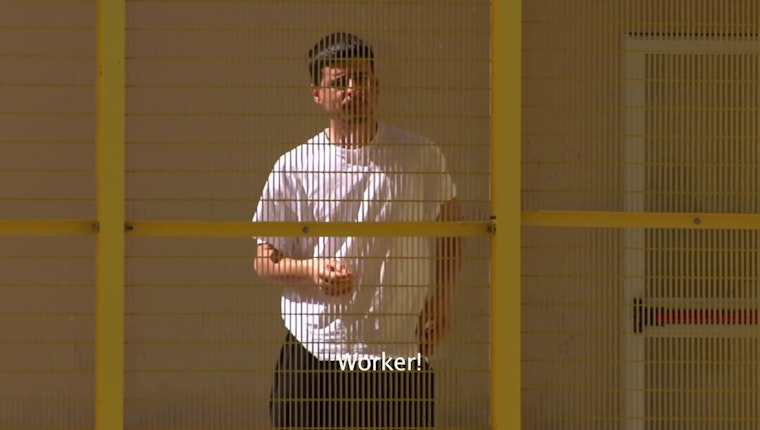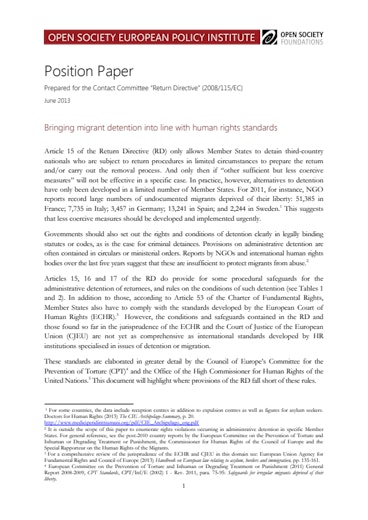Migrant Detention and Human Rights in the EU
By Costanza Hermanin

Over the last four months, some 18,500 people fleeing instability in Africa and Syria have landed in Italy. Migrants are also arriving in other EU border countries—particularly Greece, Spain and Bulgaria—even though most of them are aiming for Germany, Sweden, France, and the Benelux countries. The EU’s main policy tool for dealing with irregular migrants—people who arrive in Europe to escape poverty and political instability, but do not qualify for international protection—is readmission, regulated by the “Return Directive.”
Readmission provides for people to be returned to their country of origin or a safe third country of transit. However, readmission policy alone is ineffective and, in some cases, member states’ methods of returning migrants breach fundamental rights.
The European Commission recently published a report on the implementation of the Return Directive, on March 28, 2014, which found that the number of migrants who are in the EU for economic reasons without a valid visa, or who have lost their permit of stay, far outstrip the numbers that member states are able to return.
EU member states detect approximately 500,000 undocumented migrants each year. However, between 2010 and 2012, member states only returned around 200,000 such persons annually, less than 50 percent. In 2008, undocumented migrants resident in the EU-27 were estimated at between 1.9 and 3.8 million. Several factors can prevent readmission, including lack of cooperation from the country of origin and transit, or from migrants themselves.
Because of difficulties with readmission, many member states resort to prolonged detention of undocumented migrants, although the Return Directive calls it an “option of last resort,” to be applied in very specific cases. Detention, which is used in part to deter irregular migration, is often in degrading conditions.
In Italy, for instance, Medicines for Human Rights reports close to 8,000 irregular migrants detained each year. Analysis by the Sant’Anna School for Advanced Studies suggests that the Italian framework for detention of irregular migrants is in clear breach of fundamental rights standards, as well as the Italian constitution and EU law. For instance, Italian law contains no provisions guaranteeing adequate conditions of detention, and the way the law is applied in practice does not provide for sufficient procedural safeguards against abuse.
The Open Society Foundations helped restore access for monitoring organizations to the Italian centres for identification and expulsion, through a public campaign and litigation. This was followed by support for the production of the first documentary (see above) showing, from the inside, the stories of detained migrants who are in legislative limbo.
Unfortunately, the Commission’s response to the widespread use of detention was merely to announce its intention to study and promote alternative tools in the future. A more ambitious approach would have set out policy solutions, drawn from existing good practices on voluntary and forced returns, to be implemented within a given timeframe.
On poor detention conditions, the Commission underlines that member states need to respect standards on material conditions and procedural safeguards set by the European Committee on the Prevention of Torture. It also calls on the Council of Europe to codify safeguards for those detained because of their immigration status.
These are important steps forward and ones that Open Society has been advocating. By clarifying that these standards are required by the Return Directive, the EU is introducing a level of protection for undocumented migrants that is better than that offered by many EU member states under national law.
A notable absence in the EU’s framework on returns is a policy for “non-removable returnees.” Undocumented migrants who cannot be returned are often left indefinitely without any legal status. Consequently, their basic rights are not guaranteed, so they are open to abuse and exploitation, and they remain at risk of being unlawfully re-detained. The Commission’s report does not set out any specific proposal for non-removable migrants. This is likely to be due to the fact that many member-states view this “limbo” situation as a deterrent to would-be migrants, and would thus not welcome such a proposal.
Many member states have made it a criminal offense to be present on their territory without permission. The Commission underlines that EU law does not allow detention to be ordered as a criminal law sanction for undocumented migrants. In addition, the European Union Agency for Fundamental Rights has repeatedly underlined that criminalization deprives irregular migrants of their fundamental rights, in particular access to basic services.
This can also have a negative impact on the general public. For instance, migrants do not use health services for fear of being reported to the police, which can lead to public health risks where contagious conditions go untreated.
The fact that undocumented migrants continue arriving suggests that policies of detention and criminalization do not function as deterrents against irregular migration. The EU needs a new approach that includes broader measures to tackle push and pull factors behind irregular migration. The Commission’s earlier Communication “The Future of Home Affairs” failed to address this. It identified the main future challenges for EU migration policy to be attracting high-skilled migrants to fill particular needs and fighting people smugglers to reduce irregular migration. However, it failed to acknowledge explicitly that trafficking and smuggling is driven by demand for low and medium-skilled workers.
To address the push factors that force migrants to leave their home countries, the EU should not focus exclusively on measures to attract high-skilled migrants. It could, rather, review the whole of migration policy in the context of its foreign, trade, aid and employment policies, as proposed 15 years ago at the Tampere summit of 1999.
EU member states should also acknowledge that the main pull factor for irregular migrants is the demand for their labor in Europe, and open up new possibilities for EU coordination of legal migration routes. Progress on coordination of labor market needs beyond current schemes on circular migration and seasonal work would reduce the demand for irregular migrant labor. This would also help to refute populist and xenophobic rhetoric that erroneously portrays migrants as unwanted workers, when they are in fact much in demand.
Until May 2016, Costanza Hermanin was a senior policy analyst for equality, justice, and home affairs.


